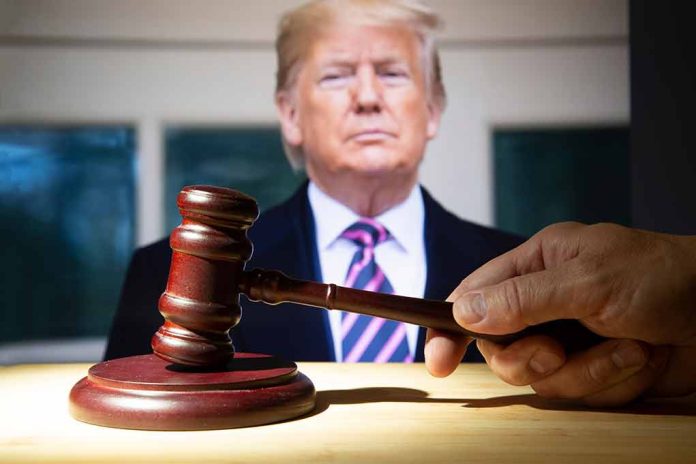
(LibertySons.org) – Former president Donald Trump has tried a bold constitutional argument to close down one of the legal issues that’s been troubling him. He argued that the Georgia election interference case violated his right to free speech. Unfortunately for him, the judge hearing the argument doesn’t agree.
Trump Gambles On First Amendment
Last August, Fani Willis, the district attorney of Fulton County, Georgia, indicted Trump and 18 others under Georgia’s Racketeer Influenced and Corrupt Organizations (RICO) statute. The case has drawn a lot of controversy, not least after a special prosecutor hired by Willis turned out to be her boyfriend and spent much of his large fee on expensive gifts for her.
Trump says the case isn’t just controversial; it’s unconstitutional, too. On March 28 Fulton County Superior Court Judge Scott McAfee heard an argument by the former president’s legal team that the case is seeking to criminalize political speech and advocacy.
The case hinges on Trump’s claim that the 2020 presidential election was stolen by widespread vote rigging and his attempts to prove this had taken place. His lawyers argue that everything he said on the subject was legitimate –- legal lead Steve Sadow said for the sitting president to discuss possible election fraud is “the height of political speech” and is protected under the First Amendment even if what he said turned out to be wrong.
On April 4, Judge McAfee ruled on the motion. He said the charges don’t suggest Trump and his co-defendants are on trial for making false statements. Instead, he said, the charges allege that they deliberately tried to harm the government by interfering with the election. He also said that even political speech is “not impenetrable from prosecution” if it’s linked to criminal activity.
McAfee made clear that he has to give the prosecution some latitude in the pretrial stage. It isn’t all bad news for Trump, though. The judge agreed that Trump and his fellow accused could bring up similar arguments once the actual trial begins. Sadow highlighted that in his response to the ruling, although he also made clear that the defendants “respectfully disagree” with McAfee on this issue.
While this ruling went against Trump, prosecutors aren’t getting it all their own way. On March 13, McAfee dismissed six charges, including three against Trump. He said the indictments didn’t have enough detail about the alleged offenses, a point Trump’s lawyers had already brought up. The judge said the vagueness of the charges didn’t allow the accused to prepare a defense against them.
~Here’s to Our Liberty!
Copyright 2024, LibertySons.org









